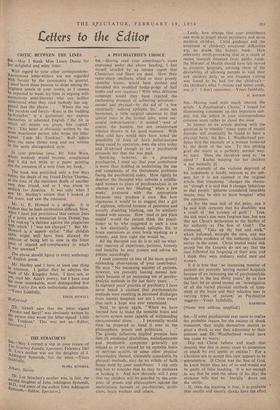A PSYCHIATRIST'S CHOICE SIR,—Having read your contributor's views expressed under
the above heading, I feel myself invaded by an intense regret that Chesterton and Shaw are dead. How their razor-sharp intellects, allied to their grossly unstable brains, would have slashed and shredded this muddled hodge-podge of half truths and non sequiturs! With what delicious contempt would they have rejected the enchanting prospect of achieving salvation— mental and physical—by the aid of ' a few electrically induced epileptic fits,' some sex hormones, a little surgical attention to that special tract in the frontal l9be, some suc- cessful indoctrination= if needed '—and of course, the humble, but not unimportant vitamin thrown in for good measure. With what cold fury would they have noted the possibility of Joan of Arc's hallucinations being cured by operation, were she alive today and ill-advised enough to let a psychiatrist persuade her that she was mad.
Speaking, however, as a practising psychiatrist, I must say that your contributor is more than justified in underlining the size and complexity of the therapeutic problems facing the psychiatrist today. How rightly he despises the therapist who submits a middle- aged woman to years of psychoanalysis in an attempt to cure her 'blushing' when a few weeks' treatment with the appropriate hormone may produce a cure. But how ingenuous it would be to suggest that a girl of eighteen, referred because of persistent and socially disabling blushing, can be similarly treated with success. How ' mad or just plain stupid' would the patient think the practi- tioner to be who suggested in such a case a few electrically induced epileptic fits or brain operations or even brain washing as a remedy, and how right she would be.
All the therapist can do is to call on what- ever reserves of experience, patience, honesty and humility he may possess and advise his patient accordingly.
I must comment on two of the more grossly misleading observations of your contributor. He says " No increasing number of patients, however, are provenly leaving mental hos- pitals because of an increasing use of psycho- analytic methods in the last thirty years...." In eighteen years' practice of psychiatry I have never heard it claimed that psychoanalytic methods were resulting in increased discharges from mental hospitals nor am I even aware that such a hope was ever entertained.
Next, to quote again, " When we have learped how to make the unstable brain and nervous system more capable of withstanding environmental stress . . . I personally would then be prepared to hand it over to the philosophers, priests and politicians. . . ." The grossly fallacious implied premise here that all emotional disabilities, maladjustments and psychiatric symptoms generally are related to or are caused by an unstable brain or nervous system, or some other physical abnormality thereof, ultimately remediable by physical methods, may be an article of faith firmly held by your contributor. I can only beg him to consider that he may be mistaken in holding it. And how devoutly will I pray that my children will be guarded by the com- pany of priests and philosophers against the materialistic heresies of psychiatrists, politi- cians, brain washers and others. Lastly, how strange that your contributor can write at length about psychiatry and never mention children. Child guidance and the treatment of children.'s emotional difficulties are, no doubt, like history, bunk. How relevantly mirth-provoking that as a result of recent research financed from public funds, the Minister of Health should have felt moved to circulate 4ospitals, advising them of the desirability of allowing parents to visit their sick children daily, as less frequent visiting was found to be bad for the children's— the children's what ?—brains and spinal cords, was it ? I don't remember.—Yours faithfully,


































 Previous page
Previous page